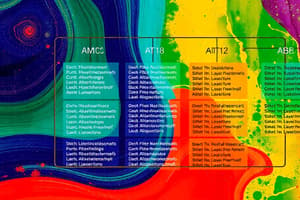Podcast
Questions and Answers
Which of the following data models is NOT directly used by any databases?
Which of the following data models is NOT directly used by any databases?
- Relational Data Model
- Hierarchical Data Model
- Entity-Relationship Model (correct)
- Network Data Model
Who originally introduced the relational model in 1970?
Who originally introduced the relational model in 1970?
- E.F. Codd (correct)
- Ted Codd
- Peter Chen
- Charles Bachman
Which data model specifically uses graph structures for semantic queries?
Which data model specifically uses graph structures for semantic queries?
- Document Model
- Object-Oriented Model
- Graph Model (correct)
- Relational Model
What is a characteristic of the Document model in data storage?
What is a characteristic of the Document model in data storage?
Which one of the following options is a key feature of a Database Management System (DBMS)?
Which one of the following options is a key feature of a Database Management System (DBMS)?
Which data structure is commonly arranged for ease and speed of search and retrieval?
Which data structure is commonly arranged for ease and speed of search and retrieval?
What is the primary focus of the hierarchical data model?
What is the primary focus of the hierarchical data model?
What does the object-oriented model present information as?
What does the object-oriented model present information as?
What is one primary purpose of a database management system?
What is one primary purpose of a database management system?
Which of the following is considered a type of data example?
Which of the following is considered a type of data example?
Which characteristic should data possess to be meaningful?
Which characteristic should data possess to be meaningful?
What percentage of the assessment is attributed to the closed-book exam in the module?
What percentage of the assessment is attributed to the closed-book exam in the module?
What is an important activity to do before assessments according to the module information?
What is an important activity to do before assessments according to the module information?
What does a relation represent in the context of databases?
What does a relation represent in the context of databases?
Which of the following statements about tuples is correct?
Which of the following statements about tuples is correct?
Which key uniquely identifies each tuple in a relation?
Which key uniquely identifies each tuple in a relation?
Given the examples, which combination uniquely identifies an office room?
Given the examples, which combination uniquely identifies an office room?
What ensures the uniqueness of a staff member's identity in a database?
What ensures the uniqueness of a staff member's identity in a database?
What is true about super keys in database relations?
What is true about super keys in database relations?
Which of the following is NOT a type of relational key mentioned?
Which of the following is NOT a type of relational key mentioned?
Why are duplicate tuples disallowed in a relation?
Why are duplicate tuples disallowed in a relation?
What does a foreign key in a database ensure?
What does a foreign key in a database ensure?
Which of the following correctly describes the attributes of a foreign key?
Which of the following correctly describes the attributes of a foreign key?
In the database example provided, which ticket belongs to the group with the largest table size?
In the database example provided, which ticket belongs to the group with the largest table size?
Which combination of attributes can uniquely identify an office?
Which combination of attributes can uniquely identify an office?
What is the definition of a superkey?
What is the definition of a superkey?
What information is NOT typically included in a foreign key relationship?
What information is NOT typically included in a foreign key relationship?
Which of the following statements about candidate keys is false?
Which of the following statements about candidate keys is false?
Which option correctly classifies a primary key?
Which option correctly classifies a primary key?
In the context of the given office data, which room has a printer?
In the context of the given office data, which room has a printer?
What is the function of an alternate key?
What is the function of an alternate key?
If a relation has multiple candidate keys, how many of these can be primary keys?
If a relation has multiple candidate keys, how many of these can be primary keys?
Which key consists of more than one attribute?
Which key consists of more than one attribute?
Flashcards are hidden until you start studying
Study Notes
Module Overview
- Instructors: Jianjun Chen, Jun Qi, Yu Liu with designated office hours.
- Textbook: "Database Systems: a practical approach to design, implementation, and management" by Thomas M. Connolly and Carolyn E. Begg.
- Assessment: 15% from two online quizzes and 70% from a closed-book exam.
Importance of Collaboration
- Engaging in discussions enhances understanding of concepts and terminology.
- Regular notifications from instructors regarding updates and important announcements.
Understanding Data
- Data examples include documents (docx) and spreadsheets (Excel) containing relevant information.
- Meaningful data requires specific contexts and restrictions on access to authorized users.
Data Models
- Defined as organized collections of data structured for efficient search and retrieval.
- Key models include:
- Relational Data Model: Data is organized in tables.
- Hierarchical Data Model: Data organized in a tree-like structure.
- Network Data Model: Data organized as a graph.
- Entity-Relationship Model: Used for teaching, not implemented in databases.
- Graph Model: Utilizes nodes and edges for semantic queries.
- Document Model: Stores information in JSON/XML.
- Object-Oriented Model: Information presented as objects.
The Relational Model
- Introduced by E.F. Codd in 1970.
- Enforces uniqueness with no duplicate tuples.
- Each relation represents a class/type of objects with tuples as instances.
Relation Keys
- Super Key: Any attribute(s) that uniquely identifies a tuple.
- Candidate Key: A minimal super key with no proper subset also being a super key.
- Primary Key: Selected candidate key for unique identification.
- Foreign Key: Attribute(s) in one relation that reference a candidate key in another relation.
Examples of Relations
- Staff table attributes might include ID, Name, Salary, and Department.
- Combination keys are needed where single attributes are not unique (e.g., Building Number + Room).
Identifying Key Attributes
- Tuples in staff or office relations can have overlapping attributes (like Name or Room Size) but must have unique identifiers (like ID or a combination of Building Number and Room).
- Composite keys allow identification using multiple attributes.
Questions for Understanding
- Queries to test knowledge on which attribute combinations uniquely identify relations, particularly in office and teaching staff scenarios.
Assessment Preparation
- Encourage weekly revision and not being solely reliant on slides before assessments.
- Utilize lab sessions to clarify doubts and enhance understanding of practical applications.
Studying That Suits You
Use AI to generate personalized quizzes and flashcards to suit your learning preferences.




